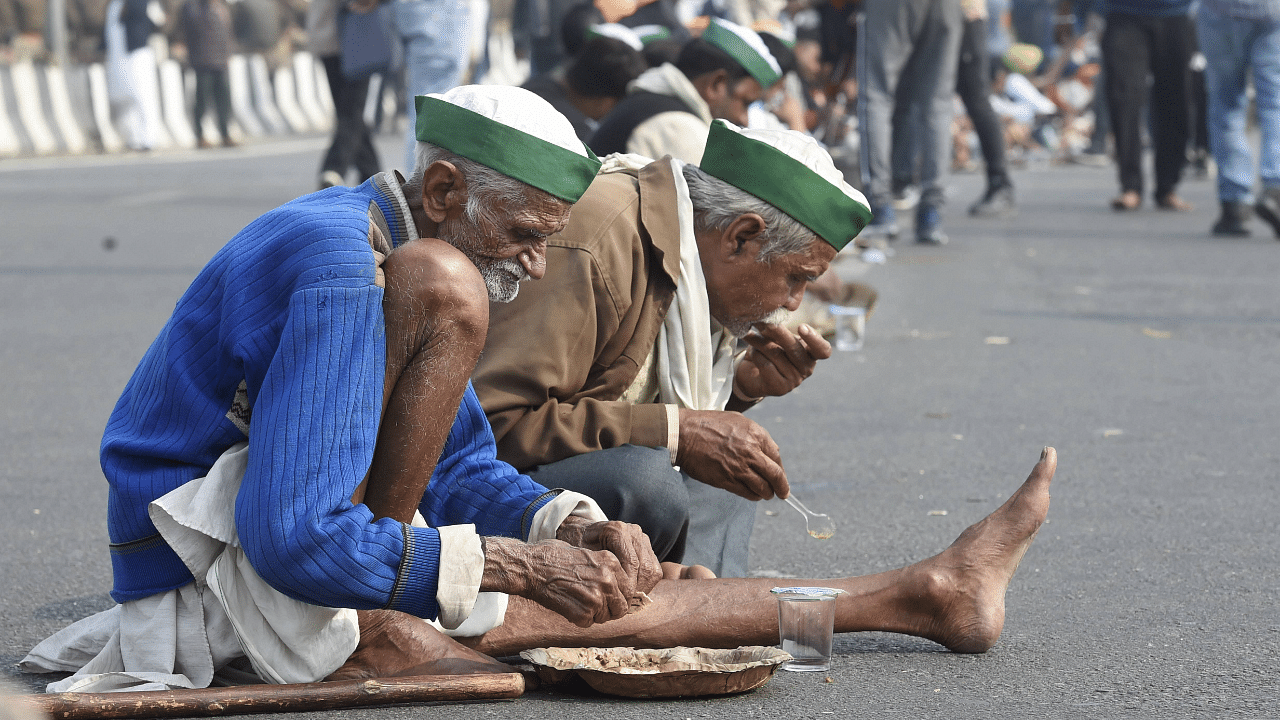
When the owner of Rajputana restaurant, a humble roadside eatery at the Singhu border, began to feel that he had survived the worst economic fallout of the Covid-19 pandemic, the farmers protest started. Two months later his restaurant is still empty even though the highway this time is packed.
Round-the-clock langar service, complete shut-down of industries, and no movement of people and vehicles are proving to be a death knell for several eateries dotting the stretch on both sides of the Delhi-Haryana national highway.
Thousands of farmers, mostly from Punjab and Haryana, are demonstrating at the national capital's border points since November 26 demanding that the three contentious farm laws be repealed.
"Why would people come to have food here when they can get it for free in langars outside?" asked a frustrated and tense Om Prakash Rajput, the owner of the eatery.
"What business? No one comes at all. I am paying Rs 35,000 as rent for this shop and have eight employees. For how long can I manage to pay the salaries and rent without any income? If it continues like this, I will have no option but to shut it," said the 40-year-old, who also runs a private security agency.
Mohammad Ehsaan, 23, who hails from Bihar and works as a cook in the restaurant, said Rajput told him that he will close the eatery next month. Ehsaan, with his salary reduced from Rs 17,000 to Rs 14,000, is already hunting for a new job.
With chairs placed on tables, cooks and waiters lying idle, and prospective customers busy langar-hopping, for the owners of food businesses at Singhu -- the nerve-centre of the farmers' agitation -- the monetary situation is worsening by the day.
Punjabi Zaika, a small eatery, for instance, with sales less than Rs 1,200 per day is not certain about its future.
Situated adjacent to the main stage of the protest site, they stopped cooking their best-selling non-vegetarian dishes because customers would be afraid to have it in the vicinity of the stage which also serves as a platform for prayers and kirtans.
"We open our shops, sit here and leave. It is empty for the most part of the day. Everyone eats their meal at langar only. Since most of them are from villages they don't have an appetite for snacks anyway," said Sahab Singh, owner.
"Throughout the day, hardly three-four people come. I am paying Rs 30,000 rent and salaries of my three employees from my own pocket," he added.
Things are equally bad, if not worse, for the big restaurants. In most of these outlets, their employees have been outnumbering the customers since the protest began.
Shree Makhan Bhog, a one-stop-shop for bakery, sweets and vegetarian snacks, has seen at least 50 per cent dip in the sales since the start of the protest.
"The demand is mostly of cold-drinks or packet mixture or other snacks. No one is coming here to have a full meal," said Radhey Shyam, manager at Shree Makhan Bhog.
While some eateries are staring at a sad ending of their once flourishing ventures, Anshu Kumar rented out space for his cafe just two days before the protest started and hasn't seen a single day of good business.
His hole-in-the-wall eatery, which mostly serves fast-food, is right next to the Kisan Andolan office which hosts kisan union meetings and press conferences. Though the proximity to the office has helped him gain some footfall, it's just enough to break even.
"The highway is supposed to be a good place for an eatery but then who knew about the farmers' protest. The owner of this place told me he won't take rent for the time being. But I know I owe him some amount for sure," said Kumar, who started the joint after he faced losses in his clothing business during the coronavirus-induced lockdown.
In the past when it rained, he said his sale for the day didn't even cross Rs 100. Kumar drives a two-wheeler and the fuel expenses alone are over Rs 300 a day.
"The most I have earned so far in a day is Rs 3,000," said the 53-year-old, who lives in Burari. The most expensive dish on his cafe's menu costs Rs 400.
At his wits end, Rajput urged the government to vacate the space sooner than later. He alleged that most of the protestors camping here are "arthiyas, businessmen and not farmers".
His employee Ehsaan, however, begs to differ on. "They all are farmers fighting for their survival. I support them. And one more thing, their langar is 'ek number' (first-class)," said Ehsaan, who impishly admitted to cherishing the langar meal many times himself.